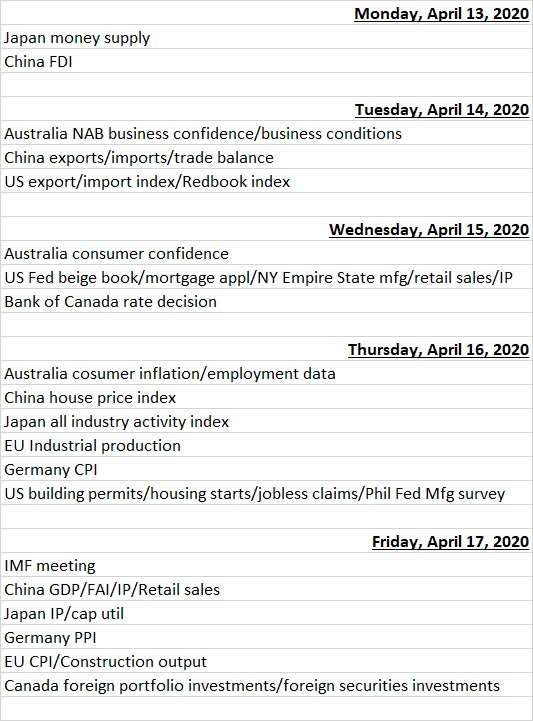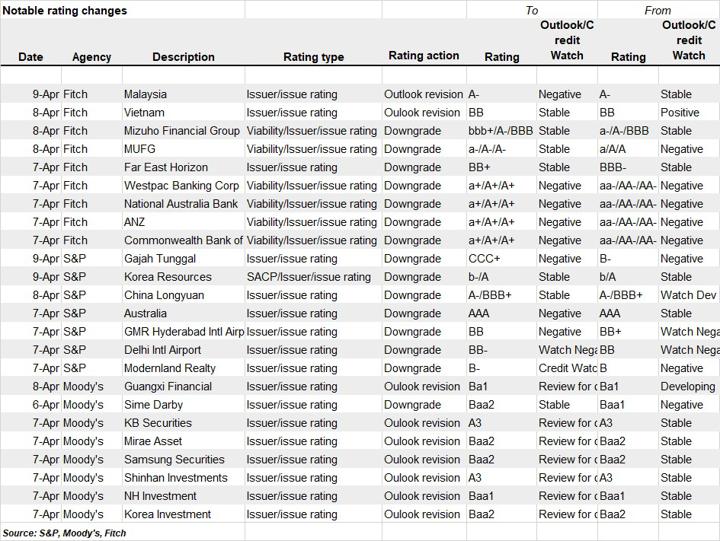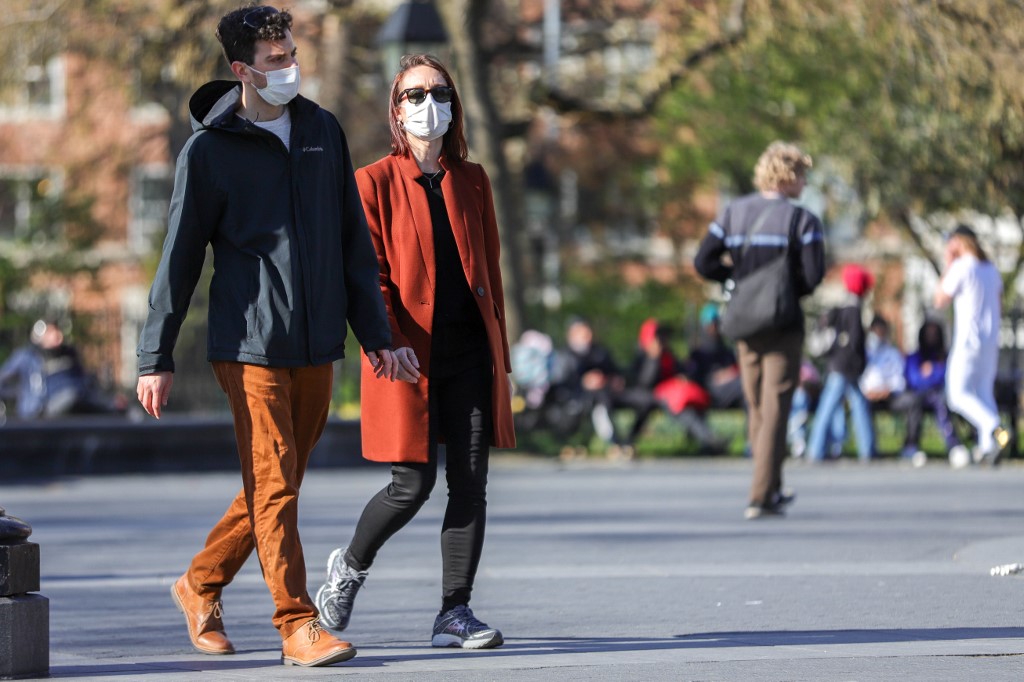(ATF) Financial markets could get a lift from comments from US leaders who hinted the world’s largest economy could start reopening in May. The White House health adviser Dr Anthony Fauci said on CNN the coronavirus outbreak is slowing down in the United States and parts of the country may resume business by May. His comments echoed optimism expressed by Treasury Secretary Steven Mnuchin who said last Thursday the US could open back up next month.
The OPEC-plus agreement to cut production by 10 million barrels will also provide a boost after the collapse in oil prices battered energy stocks whose market capitalization dominates many benchmarks. Oil producers like Shell and ExxonMobil have already announced significant cuts in their capital expenditure.
The week ahead will also unveil possible additional measures by the meeting of G20 finance ministers and central bank governors as they continue to discuss and take urgent actions needed to address the global challenge presented by the Covid-19 pandemic. They will meet under the Saudi G20 presidency on Wednesday April 15 as the spread of the coronavirus hangs heavy over investor minds with the infection count of the global pandemic crossing the 1.8 million mark.
As the global economy hurtles towards a recession, markets will await the World Economic Outlook presentation by IMF chief economist Gita Gopinath on Tuesday April 14. Last week, IMF managing director Kristalina Georgieva said it would be the worst recession since the Great Depression. This report comes ahead of the April 17-19 Spring Meetings of the IMF and World Bank, which are now scheduled to be held online.
Historic oil cut
OPEC and its allies agreed to a historic 10-million-barrels-a-day production cut last Thursday, but opposition from Mexico held up a final deal. Then on Sunday OPEC and its oil-producing allies struck agreed to cut production by 9.7 million barrels per day – the single largest output cut in history.
“China seems to have won the battle with the invisible enemy and if things turn back to normal there then oil demand will surge. In Europe, Italy seems to have turned the corner too, and the number of new coronavirus infections in Spain have fallen to a record low since the outbreak began. The worst could be behind us now,” Fawad Razaqzada, an independent market analyst at TradingCandles.com, said.
“Yes, supply of oil is currently excessive. But if demand starts to recover and with the supply of oil set to fall over the next couple of years, there could be a supply shortage (unlikely but possible). But as Saudi’s Energy Minister Prince Abdulaziz bin Salman said, the historic agreement demonstrates that OPEC+ is ‘up and alive’. You also have the US supporting the OPEC+ by apparently agreeing to cut its production by 300K bpd after Mexico’s standoff. In other words, the price [war] is over. At least for now anyway.”
China data coming
China will report its GDP data on Friday along with its fixed asset investments, industrial production and retail sales data, which will reveal the true extent of the economic damage from the pandemic.
“China was the epicenter of the Covid-19 outbreak, and given signals from extremely soft PMI surveys, as well as retail sales and industrial output, economic activity looks certain to have plunged in Q1. We expect Q1 GDP to decline some 10.0% quarter-over-quarter (consensus @ 11.2%), which would see Q1 GDP down 5.9% year-over-year (consensus @ -6.0%),” Wells Fargo senior economist Sam Bullard said.
“China’s economy improved a bit in March as the outbreak eased, with the manufacturing and services PMI both jumping higher. That said a complete recovery in activity is unlikely, with the consensus forecast for March retail sales to fall 10% and industrial output to fall 7.0%, both year-over-year. Similarly, while we expect GDP growth to resume in Q2, we do not expect the first quarter losses to be fully recouped, and we forecast China’s GDP to fall 1.2% for full year 2020,” he added.
Fund flows
Optimism that the coronavirus spread has begun peaking was reflected in fund flows as investors tiptoed back into equity markets in early April, data showed. The flight to cash that saw Money Market Funds absorb more than $700 billion in March slowed during the week ending April 8 when $101 billion flowed into those funds, data provider EPFR said. Equity Funds saw an aggregate inflow of $17.6 billion while Alternative Funds saw $3.3 billion of inflows. Investors pulled a net $1 billion out of Bond Funds and $1.9 billion from Balanced Funds in that week.
Still Emerging Markets Equity Funds recorded their eighth consecutive weekly outflow in early April as retail inflows were offset by institutional selling. China Equity Funds recorded their biggest retail inflow since 1Q18 but posted outflows overall for the first time in four weeks, EPFR said.
“Managers of those funds have aggressively rotated exposure to the technology and healthcare sectors, both of which were front and center during the drive to contain the Covid-19 outbreak. Chinese authorities are expressing confidence China’s economy will grow during the second quarter, but many investors are skeptical given the current expectations for the global economy,” the data provider said.
Companies in focus
Alibaba Pictures Group after the company issued a warning its loss will expand for the year to March 31, 2020. The company said its loss will range between 1.1 to 1.2 billion yuan, compared with a a loss of 254 million for the financial year ended March 31, 2019. “The significant increase in the aforesaid loss was primarily due to the complicated difficulties in pursuing profitable operation faced by the entertainment industry in mainland China since 2019 and the significant decrease in the group’s revenue in the fourth quarter of the 2019/20 financial year as a result of the outbreak of Covid-19, as well as the substantial impairment provisions made by the group for certain receivables and investment project(s) during the 2019/20 financial year,” it said.
GuocoLand Ltd after it sold its hotel property in China together with adjoining assets for 1.44 billion yuan. It said the transaction allowed it to realise the capital value of the property and the proceeds would be used for general working capital, including repayment of debts.
Economic data calendar


























